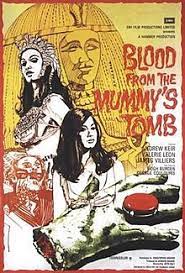
In ancient Egypt an evil Egyptian queen called Tera is entombed. Having been drugged her right hand is cut off and fed to Pharaoh Hounds. On her hand is ring with a blood red stone. A wind stirs up and the dogs are killed. The priests who bury her are also mysteriously killed, their throats viciously cut.
Centuries later the tomb is uncovered by an expedition led by Julian Fuchs (Andrew Keir). Included in the expedition party are Corbeck (James Villiers), Professor Dandridge (Hugh Burden), Berigan (George Coulouris) and Helen Dickerson (Rosalie Crutchley). They open the sarcophagus and find Tera’s body in pristine condition. Her severed hand lies on the ground next to the sarcophagus. At that very moment, in England, Professor Fuchs’ wife is giving birth. His wife dies giving birth and at first it appears that the baby does too. Suddenly the doctor hears a strong heartbeat from the baby. Unknown by everyone, the spirit of Tera has entered the body of the baby. In the crypt, the stump where Tera’s hand used to be begins to bleed. The coffin and relics are taken back to England.
Years later the child, named Margaret (Valerie Leon) is now grown and is the exact image of the evil Queen Tera. Margaret’s father gives her the ruby ring on the eve of her birthday. Interested in the ring and its origins Margaret’s boyfriend Tod Browning (Mark Edwards) takes her to see a friend of his. The man happens to be one of the men from the expedition, Professor Dandridge. Reacting to both the ring and Margaret’s face Dandridge has a severe panic attack. Later Margaret finds her father in a forbidden room of the house with his throat slashed. Margaret calls Dr. Putnam (Aubrey Morris), the family doctor. Julian is alive but once he wakes up Dr. Putnam says he will most likely be paralyzed on one side.
While Julian is still comatose Margaret is visited by another man from the expedition, Corbeck, who explains some of what happened years ago when the tomb of Tera was uncovered. Corbeck’s ulterior motive is to restore Tera to life. To do that he needs to gather up the relics held by the other members of the expedition. He wants Margaret to help him. The other members of the expedition are killed one by one and the relics gathered. Margaret, being influenced by Tera’s spirit, assists in gathering the relics not knowing that the restoration of Tera means her own death.
“Blood From the Mummy’s Tomb” was released in 1971 and was directed by Seth Holt and an uncredited Michael Carreras. Carreras took over directing after the death of Holt. It is a British horror movie produced by Hammer Films and was loosely adapted from Bram Stoker’s 1903 novel “The Jewel of Seven Stars”. It is the fourth and final of the Hammer mummy films.
Originally Peter Cushing was cast as Professor Fuchs however his wife’s illness caused him to leave production. Andrew Keir was then cast in his stead. This is also the only Hammer "Mummy" film in which Michael Ripper does not appear. Mark Edward’s character Tod Browning was named in homage to director Tod Browning, director of such horror films as “Dracula” 1931 and “Freaks” 1932. The real name of Tod’s cat is Sunbronze Danny Boy. He even has a film credit.
Although it is not the best of the Hammer films it is far from the worst and does have an interesting story that is not typical of Hammer’s previous “Mummy” films. Also, the fact that none of the standard Hammer cast are employed adds more distinction from the Hammer norm. Instead of a shuffling cloth wrapped mummy, this one has a voluptuous raven haired beauty. Valerie Leon’s performance as the evil Egyptian queen is sensual and a little scary. There is also plenty of killing and a rather creepy episode in a mental ward that is a little unhinged.
If you like your mummies wrapped and dusty you may feel cheated but if you are ok with lots of cleavage and smoldering eyes you found the right movie. It may be different but it is a nice blend of good story and good acting. A little underrated it is far better than some of the other Hammer films being produced in the early seventies.

